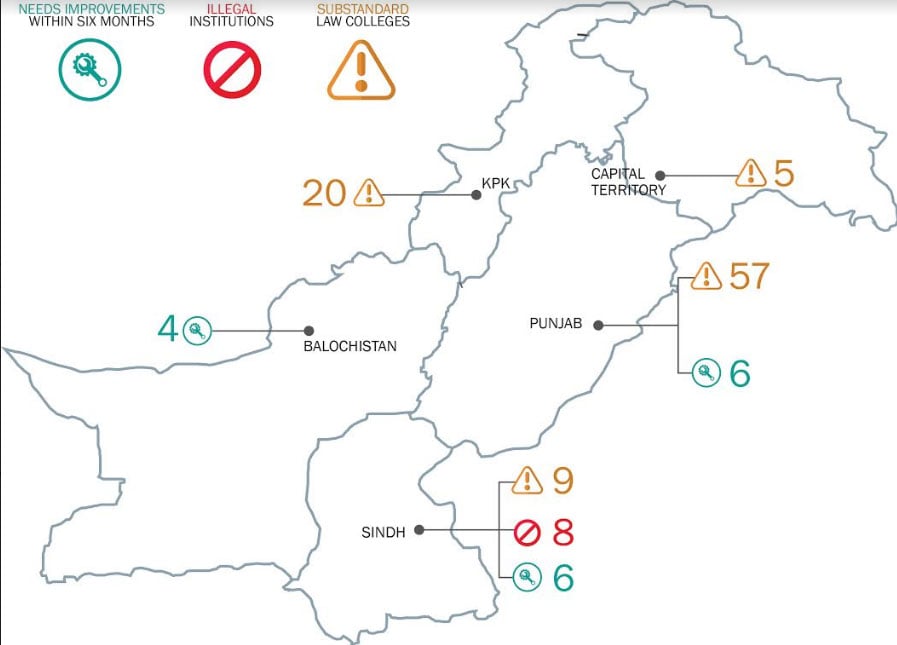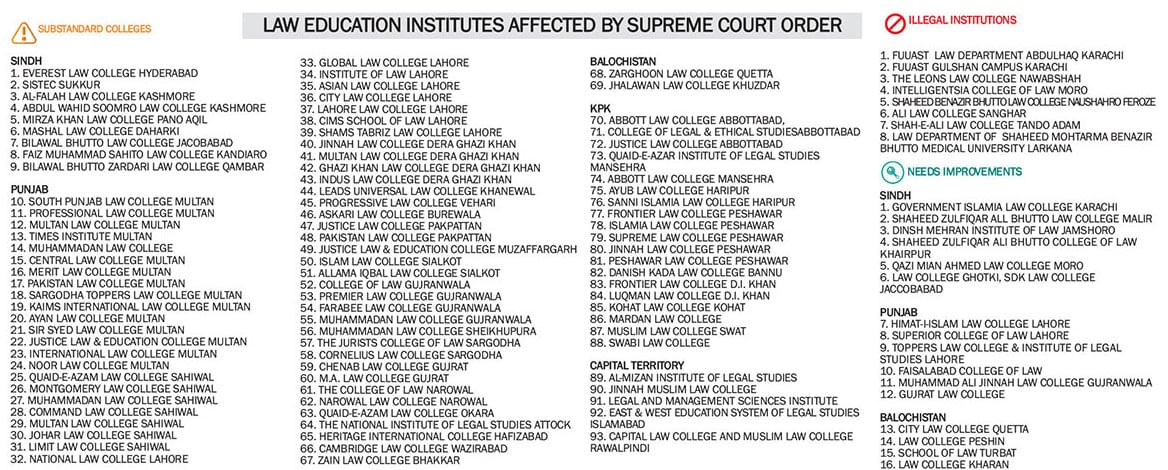Major overhaul expected in legal education in 2019
Whether the year 2019 will witness major reforms in the overall education sector of the country or not is a question, the answer of which will gradually unfold over the year. However, what seems certain is that the legal education will witness a significant revamp as the top judiciary has given various directives in this regard.
Over the years, the law profession has attracted more and more students as a career choice leading to a mushrooming growth of law institutes in Pakistan. Various law education institutes have been established in the country to produce lawyers; however, many such institutes have not been able to ensure high-quality legal education, due to which many fresh lawyers seem to be lacking the required knowledge and skills which could allow them a good start.
The Pakistan Bar Council (PBC), which is the regulatory body of the legal profession, also noticed the general unsatisfactory conditions of the law education in the country and approached the Supreme Court (SC) regarding it.
After hearing the petition of the PBC, the apex court issued an interim order in August this year, after which as many as 93 law colleges in the country were declared substandard institutions. The order also directed that such institutes be disaffiliated from their respective varsities.
However, students already enrolled at such institutes would be allowed to complete their ongoing LLB programme and the institutes would serve notice periods before they were disaffiliated from the varsities concerned.
The SC also banned eight law institutions in Sindh. Likewise, 20 colleges and law departments of varsities across the country were asked to take tangible steps for upgradation within six months.
The apex court also banned the three-year LLB programme and the evening classes being offered at law colleges in the interim decision.
“The 3-year LLB program will be also phased out from law colleges across Pakistan after 31 December 2018. A new 5-year LLB program will be introduced in September 2019. The evening classes being offered at all law colleges or varsities will be not allowed”, reads the SC ruling.
Varsities have started to issue notifications to comply with the apex court order. The University of Karachi on Wednesday announced that it was discontinuing its three-year LLB evening programme from 2019. Those who had secured seats in the said programme were advised by the KU admissions director to choose any other department.
PBC committee
The PBC had framed the Pakistan Bar Council Legal Education Rules (PBCLER) in 2015 to improve law education. The bylaws laid down principles on several matters concerning legal education, including criteria for the affiliation of law colleges and the recognition of degree awarding institutions.
However, on directives of the SC issued on January 21, 2018, the PBC also constituted a special committee headed by senior lawyer Hamid Khan to introduce structural reforms in legal education. Under the special committee, four provincial commissions and a committee for the capital territory were also constituted.
These commissions were tasked with inspecting the mushrooming law colleges in the country. They were assigned the responsibility to submit reports on the standards of legal educational institutions, and training and services in their jurisdiction.
The aim of such a detailed exercise was to submit recommendations for legal education reforms to the apex court.
After the special committee submitted its report to the SC, the apex court issued the interim order in which various reforms were introduced in the legal education. The reforms pertained to the processes of admissions, affiliation, entry to the bar, the appointments of faculty and other areas.
Admissions and affiliation
The SC has directed the Higher Education Commission (HEC) of Pakistan to hold an assessment test on a quarterly basis for law graduates seeking enrollment to the bar. The commission has also been directed to organise biannual admission tests for all law colleges across the country.
“No law graduate from any foreign university will be allowed to partake in the court activities unless he or she passes equivalency exams in the subjects [including] Constitution of Pakistan, Civil Procedure Code, Criminal Procedure Code, Qanoon-e-Shahadat, Specific Relief Act,” the interim order reads.
The SC has directed the varsities, which have affiliated law colleges with them, to form committees for the regular inspection of such colleges. “Every affiliating university will constitute a separate affiliating committee for the initial and annual inspection of its affiliated law colleges according to the rules framed by the PBC and the applicable rules of the affiliating university itself,” the order reads.
Illegal LLM, PhD programmes
The apex court has also imposed a ban on institutions offering LLM and PhD programmes without LLB classes. “The universities and institutions that are not recognised and authorised by the PBC to confer LLB degree will not impart legal education to students at LLM and PhD levels,” the order reads.
The same rule will be also applicable to law colleges which are offering LLM or PhD classes but not offering LLB.
Faculty and curriculum
Barring law colleges from offering three-year LLB programmes, the SC directed the HEC’s National Curriculum Review Committee to help resolve the issue of curriculum of the five-year LLB programme which could be offered according to either annual or semester system of examinations.
Regarding the faculty, law colleges and varsities have been directed by the SC to hire at least five permanent faculty members either having an LLM degree with at least five-year experience of law teaching and practical experience in a high court or having a bachelors degree in law with 10 years of law teaching experience and practical experience in a high court.
The standard ratio of permanent and visiting faculty is also to be followed to meet the needs of up to 100 students. With the increasing number of students, additional faculties will be appointed to maintain the ratio of one teacher for 20 students.
Heads of law colleges
The heads of law departments of varsities or principals of law colleges are supposed to be PhDs in legal education with eight years of law teaching experience or practice experience in high courts. Any person who has a masters degree in law with 15 years of law teaching experience or if he remained as a practitioner in a high court will be also eligible to hold the position.
Retired judges of the apex court, high courts and district and sessions courts having five years of judicial service to their credit can also be appointed as principals of law colleges or heads of the law departments of varsities, according to the criteria laid down by the SC.
To secure services of competent and experienced law faculty on a permanent basis, the authorities concerned have been directed by the apex court to ensure that a reasonable salary package and non-practicing allowance is paid to them.
Directorate of Legal Education
According to the SC order, efforts are required to be made to establish a full-fledged and adequately equipped autonomous body or a Directorate of Legal Education in the PBC to improve the standard and quality of legal education in the country.
For this purpose, the PBC will secure logistic and financial support from the federal government.
An expert’s viewpoint
Speaking to The News, Shaheed Zulfiqar Ali Bhutto University of Law (Szabul) founding Vice-Chancellor Justice (retd) Qazi Khalid Ali said although the standards of proficiency for entry to the bar had been laid down under the Legal Practitioners and Bar Councils Act 1973, they were not strictly implemented due to complacency and neglect.
“Due to such circumstances the apex court had considered the matter of declining standards of legal education in the petition of the Pakistan Bar Council versus Federal Government and others,” Ali remarked.
The legal expert was also against the evening classes for law education. “Legal education should be not a part-time academic activity because the judiciary is one of the main pillars of state and it needs committed lawyers to ensure justice in courts,” he said, adding that an ideal bar cannot be constituted until the legal education is not strengthened.
Ali blamed deteriorating state of law education for unsatisfactory performance of lower courts. “Owing to the sorry state of legal education, our judicial system, particularly lower courts, have been paralysed, resulting in delayed justice and red tape,” he said.
“An honest and industrious judicator requires an equally competent and dedicated bar in order to play an effective role for providing justice in accordance with the law to all members of society,” Ali maintained.
Data source: Supreme Court of Pakistan
Infographic by Faraz Maqbool
-
 Halsey's Fiance Avan Jogia Shares Rare Update On Wedding Planning
Halsey's Fiance Avan Jogia Shares Rare Update On Wedding Planning -
 Instagram Head Adam Mosseri Says Users Cannot Be Clinically Addicted To App
Instagram Head Adam Mosseri Says Users Cannot Be Clinically Addicted To App -
 James Van Der Beek Was Working On THIS Secret Project Before Death
James Van Der Beek Was Working On THIS Secret Project Before Death -
 Las Vegas Father Shoots Daughter's Boyfriend, Then Calls Police Himself
Las Vegas Father Shoots Daughter's Boyfriend, Then Calls Police Himself -
 'Hunger Games' Star Jena Malone Shocks Fans With Huge Announcement
'Hunger Games' Star Jena Malone Shocks Fans With Huge Announcement -
 Ex-OpenAI Researcher Quits Over ChatGPT Ads
Ex-OpenAI Researcher Quits Over ChatGPT Ads -
 Prince William Criticized Over Indirect Epstein Connection
Prince William Criticized Over Indirect Epstein Connection -
 'Finding Her Edge' Creator Explains Likeness Between Show And Jane Austin Novel
'Finding Her Edge' Creator Explains Likeness Between Show And Jane Austin Novel -
 Margot Robbie Delivers Sweet Message Ahead Of Valentine's Day
Margot Robbie Delivers Sweet Message Ahead Of Valentine's Day -
 How AI Boyfriends Are Winning Hearts In China: Details Might Surprise You
How AI Boyfriends Are Winning Hearts In China: Details Might Surprise You -
 Blake Lively Mocked Over 'dragons' After Latest Court Appearance
Blake Lively Mocked Over 'dragons' After Latest Court Appearance -
 Gmail For Android Now Lets Users Create Labels On Mobile
Gmail For Android Now Lets Users Create Labels On Mobile -
 Emma Slater Reveals Final Moments With James Van Der Beek Before His Death
Emma Slater Reveals Final Moments With James Van Der Beek Before His Death -
 Princess Kate Makes Surprise Visit To Support Mental Health Initiative
Princess Kate Makes Surprise Visit To Support Mental Health Initiative -
 Reese Witherspoon Sparks Nostalgia With 'Green Sisters' Tribute To Jennifer Aniston
Reese Witherspoon Sparks Nostalgia With 'Green Sisters' Tribute To Jennifer Aniston -
 Royal Family Faces Fresh Crisis While Andrew's Controversy Refuses To Die
Royal Family Faces Fresh Crisis While Andrew's Controversy Refuses To Die





